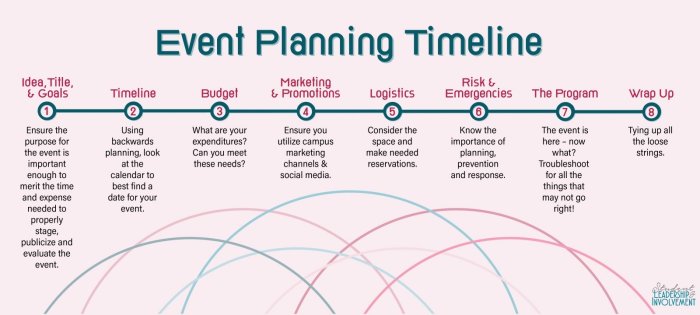Event Planning Tips: Get ready to level up your event planning game with these expert tips and tricks that will take your events to the next level. From initial steps to vendor management, we’ve got you covered. Let’s dive in!
Whether you’re organizing a small gathering or a large-scale event, mastering the art of event planning is key to success. With the right strategies and know-how, you can create memorable experiences that leave a lasting impact on your guests.
Importance of Event Planning: Event Planning Tips
Event planning is crucial for successful events as it helps ensure that everything runs smoothly and according to plan. Effective event planning can make a significant difference in the outcome of an event, contributing to its success and overall impact.
Benefits of Effective Event Planning
- Ensures proper coordination and organization of tasks and activities.
- Helps in setting clear goals and objectives for the event.
- Allows for better budget management and allocation of resources.
- Reduces the risk of last-minute issues or surprises.
- Enhances the overall attendee experience and satisfaction.
Examples of Impact of Proper Planning
- Having a detailed schedule and timeline can help in avoiding delays and ensuring that all activities are carried out on time.
- Effective communication with all stakeholders can prevent misunderstandings and ensure everyone is on the same page.
- Proper venue selection and layout planning can enhance the flow of the event and create a more engaging environment for attendees.
Initial Steps in Event Planning
When you’re getting ready to plan an event, the first steps are crucial to set the tone for a successful outcome. This initial phase is where you lay down the foundation for all the details to come, so it’s important to start strong.
Setting Clear Objectives and Goals
Setting clear objectives and goals at the beginning of event planning is like creating a roadmap for your journey. It helps you stay focused, make informed decisions, and track progress along the way. Here are some key elements to consider during the initial planning phase:
- Define the purpose of the event: Whether it’s a corporate conference, a birthday party, or a fundraising gala, knowing why you’re hosting the event will guide all your planning decisions.
- Establish a budget: Determine how much you’re willing to spend and allocate funds to different aspects of the event such as venue, catering, entertainment, and marketing.
- Create a guest list: Knowing the number of attendees will help you choose a suitable venue, plan for catering, and ensure you have enough space for everyone.
- Set a date and time: Consider factors like holidays, local events, and the availability of key guests when selecting a date and time for your event.
- Choose a theme or concept: A cohesive theme can tie all elements of your event together, from decorations and invitations to entertainment and activities.
Remember, the clearer your objectives and goals are from the start, the smoother the planning process will be. Take the time to define these early on to set yourself up for success.
Budgeting for Events

Planning an event can be a blast, but managing the budget is where the rubber meets the road. To make sure your event is a success without breaking the bank, you need to create a solid budget, manage costs effectively, and allocate funds wisely.
Creating a Comprehensive Event Budget
When creating a budget for your event, start by listing all potential expenses, including venue rental, catering, entertainment, decorations, marketing, and staff. Be sure to research costs thoroughly and leave some wiggle room for unexpected expenses. Consider using a spreadsheet or budgeting software to keep track of expenses and ensure you stay on target.
Strategies for Managing Costs
To manage costs effectively, consider negotiating prices with vendors, seeking sponsorships or partnerships to offset expenses, and finding creative ways to cut costs without sacrificing the quality of your event. Keep a close eye on expenses throughout the planning process and be prepared to make adjustments as needed to stay within your budget.
Allocating Budget for Different Aspects of the Event
When allocating your budget, prioritize expenses based on what is most important to the success of your event. Allocate more funds to key aspects such as venue, catering, and entertainment, while looking for opportunities to save on less essential items like decorations or giveaways. Remember to factor in any fees or taxes that may impact your budget and be prepared to reallocate funds as needed to stay within your financial limits.
Venue Selection
When it comes to choosing the perfect venue for an event, there are several factors to consider to ensure everything goes smoothly. From the size of the space to the location and amenities offered, each detail plays a crucial role in the success of an event.
Factors to Consider When Choosing a Venue
- Capacity: Make sure the venue can accommodate the number of guests you expect.
- Location: Consider accessibility, parking options, and proximity to public transportation.
- Amenities: Look for venues with the necessary facilities like sound systems, lighting, and catering services.
- Layout: Choose a layout that fits the event format, whether it’s a conference, wedding, or party.
- Cost: Stay within budget and negotiate to get the best deal possible.
Types of Venues and Their Suitability, Event Planning Tips
| Venue Type | Suitability |
|---|---|
| Hotels | Great for conferences, corporate events, and weddings with accommodation needs. |
| Event Halls | Ideal for large gatherings like galas, fundraisers, and trade shows. |
| Outdoor Spaces | Perfect for weddings, festivals, and team-building activities. |
| Restaurants | Suitable for intimate gatherings, birthday parties, and networking events. |
Tips for Negotiating Contracts and Securing the Ideal Venue
- Research multiple venues and compare prices and amenities before making a decision.
- Ask for a detailed contract outlining all terms and conditions to avoid misunderstandings.
- Be prepared to negotiate the price, especially if you are booking during off-peak seasons.
- Consider the flexibility of the venue in case you need to make last-minute changes to the event.
- Secure your ideal venue by signing the contract and paying the deposit as soon as possible.
Event Marketing and Promotion
Effective marketing is crucial in event planning as it helps to create awareness, generate interest, and ultimately drive attendance. Without proper promotion, even the most well-planned event may struggle to attract attendees. Here are some strategies for promoting events through various channels and creating engaging content to attract attendees.
Utilizing Social Media Platforms
- Utilize popular social media platforms such as Facebook, Instagram, Twitter, and LinkedIn to reach a wide audience.
- Create engaging posts, visuals, and videos to promote the event and encourage attendees to share with their networks.
- Utilize targeted advertising on social media to reach specific demographics and increase event visibility.
Email Marketing Campaigns
- Build an email list of potential attendees and send out targeted email campaigns with event details, special promotions, and registration links.
- Create eye-catching email templates that are mobile-responsive and include clear calls-to-action to drive registration.
- Segment your email list based on interests or demographics to send personalized messages that resonate with each group.
Collaborate with Influencers and Partners
- Partner with influencers or industry experts who can help promote the event to their followers and bring credibility to your event.
- Collaborate with sponsors or partners to co-promote the event and reach a larger audience through their networks.
- Offer affiliate programs or referral incentives to encourage partners and influencers to actively promote the event.
Vendor Management

When it comes to event planning, vendors play a crucial role in bringing your vision to life. From catering to decor, entertainment, and more, vendors are the key partners that help execute a successful event. It’s essential to select the right vendors and effectively manage them throughout the planning process to ensure everything runs smoothly.
Selecting Vendors
- Research and Interview: Take the time to research potential vendors and schedule interviews to discuss your needs and expectations.
- Check References: Ask for references from past clients to ensure the vendor has a good track record of delivering quality service.
- Review Contracts: Carefully review contracts to understand services, pricing, and cancellation policies to avoid any misunderstandings later on.
Managing Vendors
- Establish Clear Expectations: Clearly communicate your event vision, timeline, and budget to vendors to ensure everyone is on the same page.
- Regular Check-Ins: Schedule regular check-ins with vendors to track progress, address any issues, and make necessary adjustments along the way.
- Provide Feedback: Offer constructive feedback to vendors throughout the planning process to help them improve and meet your expectations.
Communication with Vendors
- Be Responsive: Respond promptly to vendor inquiries and provide timely feedback to keep the planning process moving forward.
- Be Transparent: Keep vendors informed of any changes or updates to the event plan to avoid last-minute surprises.
- Listen and Collaborate: Be open to suggestions from vendors and work together to find solutions that align with your vision and goals.
Event Day Coordination
On the day of the event, the event coordinator plays a crucial role in ensuring everything runs smoothly. They are responsible for overseeing all aspects of the event, coordinating with vendors and staff, and handling any last-minute changes or unexpected issues that may arise.
Key Responsibilities
- Manage event setup and breakdown
- Coordinate with vendors and staff
- Ensure all activities are running on schedule
- Handle any emergencies or unexpected issues
- Communicate effectively with all stakeholders
Handling Last-Minute Changes
- Stay calm and prioritize tasks
- Communicate changes to the team quickly
- Adapt and problem-solve on the spot
- Have a backup plan for critical elements
Importance of Detailed Timeline
Creating a detailed timeline is essential for a smooth event execution. It helps keep everyone on track, ensures all activities are coordinated effectively, and allows for quick adjustments in case of delays or changes. A timeline serves as a roadmap for the event day, guiding the event coordinator and team through each step of the event to ensure its success.